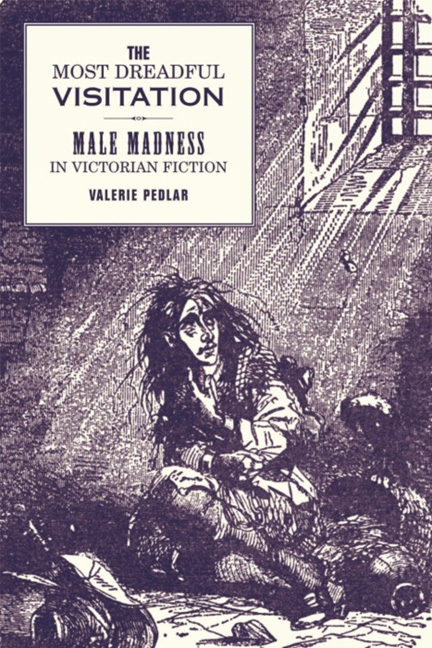Book contents
- Frontmatter
- Dedication
- Contents
- Acknowledgements
- Introduction
- 1 Insurrection and Imagination: Idiocy and Barnaby Rudge
- 2 Thwarted Lovers: Basil and Maud
- 3 Wrongful Confinement, Sensationalism and Hard Cash
- 4 Madness and Marriage
- 5 The Zoophagus Maniac: Madness and Degeneracy in Dracula
- Conclusion
- Bibliography
- Index
Conclusion
- Frontmatter
- Dedication
- Contents
- Acknowledgements
- Introduction
- 1 Insurrection and Imagination: Idiocy and Barnaby Rudge
- 2 Thwarted Lovers: Basil and Maud
- 3 Wrongful Confinement, Sensationalism and Hard Cash
- 4 Madness and Marriage
- 5 The Zoophagus Maniac: Madness and Degeneracy in Dracula
- Conclusion
- Bibliography
- Index
Summary
It is now twenty years since Elaine Showalter's ground-breaking study The Female Malady was published. This wonderfully rich and suggestive book advances the thesis that ‘madness, even when experienced by men, is metaphorically and symbolically represented as feminine: a female malady’ (p. 4). Showalter's study of the cultural history of madness as a female malady covers the representation of madwomen in literary, clinical and legal texts, and in visual media. I have confined my area of research to the nineteenth century and furthermore to literary representations of mad men, in an attempt to investigate her claim that madness is a female malady. In choosing which texts to discuss, I decided on a wide coverage that would combine some familiar novels and a well-known poem, as well as lesser-known texts. I did not aim for a comprehensive survey of the literature, since I wanted to be able to analyse the texts in some detail. Madness is implied or suggested in many nineteenth-century novels, and occurs in others as a passing feature. In the texts discussed here the madness is explicit and it is a significant feature of the narrative. I have looked at the way mad men are represented and at the way that madness functions in the texts with the aim of seeing if the onset of madness does indeed threaten a man's masculinity, whether it is the result of effeminacy, whether madness puts men into a feminised position. I was also interested to see what the treatment of men's madness in fiction might say more generally about masculinity and a man's role in society.
In his study of insanity, On Obscure Diseases of the Brain, Forbes Winslow is scathing about the accuracy of literary depictions of insanity, with the honourable and not entirely unexpected exception of Shakespeare. What I hope my study has shown, however, is that clinical accuracy is not necessarily the – or the only – aim of literary representations of madness. Certain categories, such as monomania, brain fever, idiocy or moral insanity; or belief in the hereditary nature of insanity, or in degeneration, did indeed enter into imaginative writing as they did into general currency.
- Type
- Chapter
- Information
- The Most Dreadful VisitationMale Madness in Victorian Fiction, pp. 159 - 162Publisher: Liverpool University PressPrint publication year: 2006



